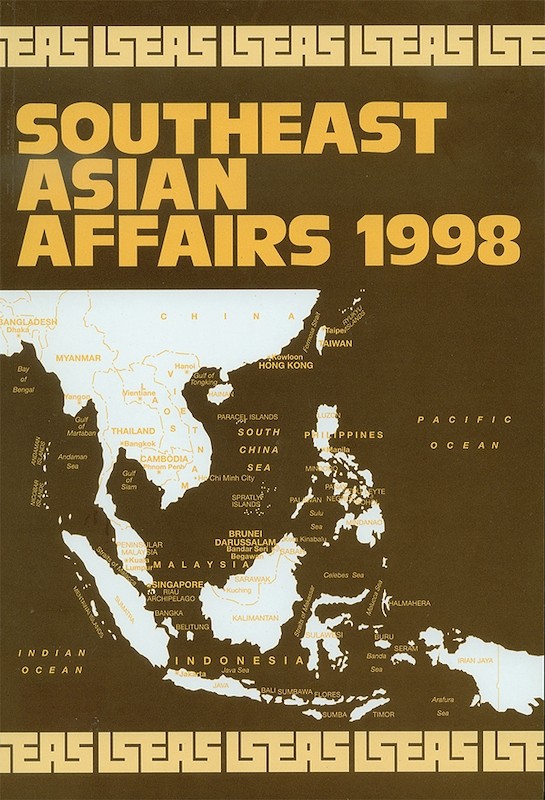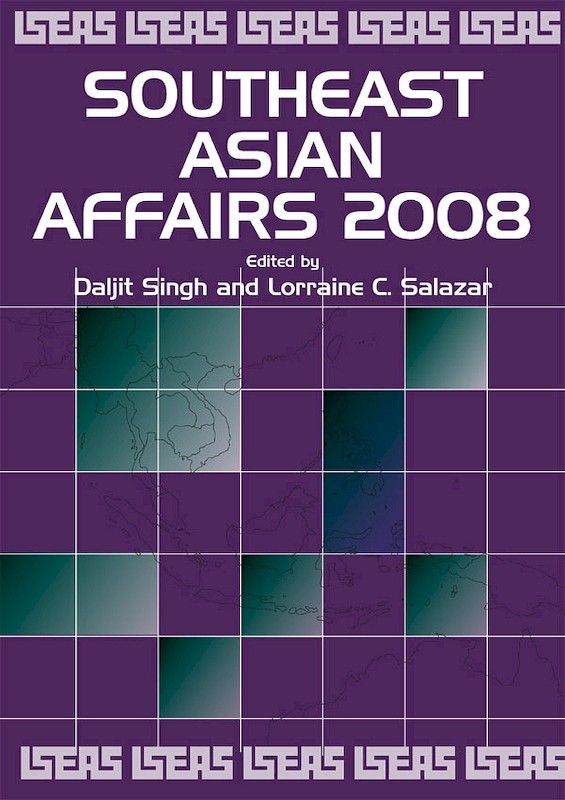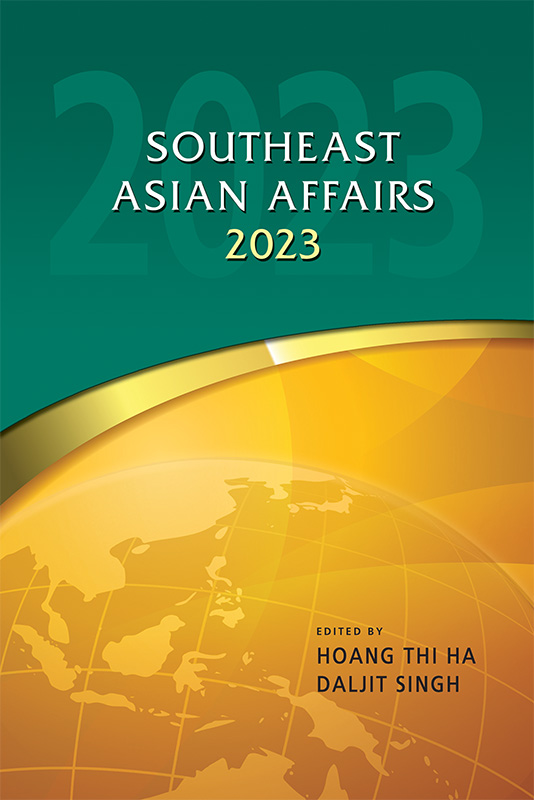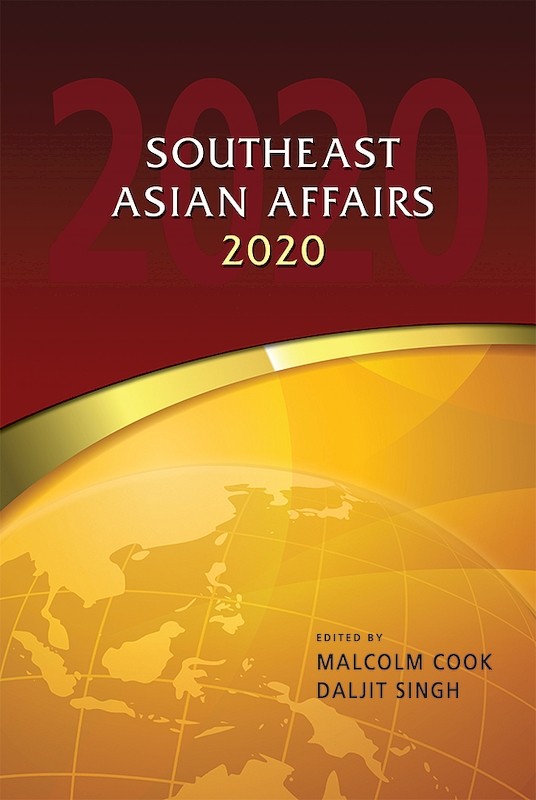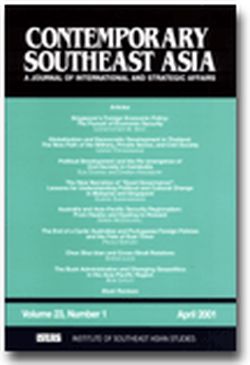Southeast Asian Affairs 1999
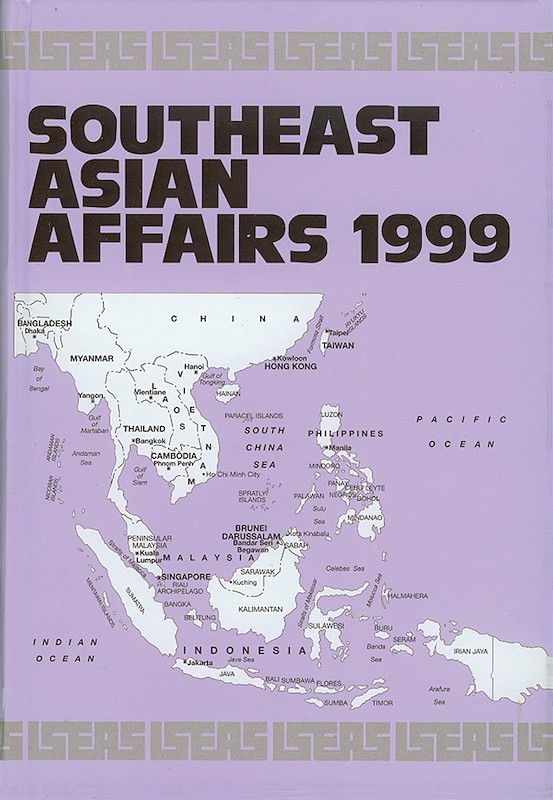
Date of publication:
2000
Number of pages:
386
Code:
SEAA99
About the publication
Southeast Asian Affairs, of which there are now twenty-six in the series, is a review of significant developments and trends in the region, with particular emphasis on ASEAN countries. The publication aims primarily at giving the enquiring reader a broad grasp of current regional affairs. Readable and easily understood analyses are made of major political, economic, social, and strategic develoments within Southeast Asia.
Contents
-
Preliminary pages
-
1. Southeast Asia: Challenges to Unity and Regime Legitimacy see abstractIn this political overview of Southeast Asia, the author argues that external and internal challenges, in particular the coincidence of ASEAN expansion with the regional economic crisis, have adversely affected ASEAN cohesiveness and its international image. The enlargement of ASEAN seemed to open a fault-line between the economically more advanced older members and the economically less developed newer states. The Asian economic crisis has now opened up a different fault-line between the politically open and the politically closed states. The author also examines the effects of these challenges on regime legitimacy of the ASEAN member states. In the section on regional security, the author looks at the implications of the economic crisis for security, the relations between the United States and China and ASEAN's posture to Chinese moves in the South China Sea.
-
2. The ASEAN Economic Miracle Unravels, by Manuel F Montes, contributor see abstractSoutheast Asian economies in 1998 experienced drastic declines, including negative rates of around 15 per cent for Indonesia, 8 per cent for Thailand and 7 per cent for Malaysia. Policies at the start of the year emphasized fiscal austerity and high interest rates. These were gradually eased as deflation became the major problem, and by year’s end most indicators suggested that these economies had bottomed. The crisis left in its wake large questions about managing external openness (particularly large international capital flows), governance (tackling "corruption, collusion, and nepotism"), and sources of growth (the importance of domestic demand and human investment compared to export-led growth).
-
3. Greater Mekong Sub-Region and the "Asian Crisis": Caught Between Scylla and Charybdis, by Nick J Freeman, contributor see abstractThe adverse effects of the Asian crisis were more far-reaching for the Greater Mekong Sub-Region (GMS) countries (Cambodia, Laos, Myanmar, and Vietnam) than most observers and political leaders had first envisaged in late 1997. For all four GMS countries, an unpleasant trinity of weaker domestic currencies, lower export earnings growth, and steep drops in foreign direct investment inflows have been the three primary consequences of the Asian crisis, though they have been able to avoid the worst of the asset price implosions and external debt overhangs witnessed in most other Southeast Asian countries. The GMS countries find themselves caught between Scylla and Charybdis. The path back to domestic central planning techniques and an isolationist foreign policy stance is simply not a viable option, yet the way forward to domestic market liberalization and greater global exposure appears more perilous than it did before the onset of the Asian crisis.
-
4. Australia's Election Year: Hansonism and the Asian Financial Crisis, by Milton Osborne, contributor see abstractMilton Osborne analyses the part played by Pauline Hanson and the One Nation Party in the 1998 Australian federal elections which took place against the background of the Asian economic crisis, a development that was seen as a " wild card" in the overall election campaign. While there is no doubt that Hanson's views on Asians and Aborigines attracted some support for her, her real voter appeal related to feeling of disenchantment with rapid economic change, particularly among regional and rural voters. Overall, the Asian economic crisis did not lead the major parties to shift from their bipartisan policies on the desirabilityof engagement with Asia, but the coalition probably gained votes by arguing that it had the best credentials for managing the Australian economy in the light of the crisis.
-
5. Brunei Darussalam: The Outside World Intrudes, by Mark Cleary, Simon Francis, contributors see abstractThe traditional calm of petroleum-rich Brunei was shaken in 1998. The regional crisis impacted directly on the state, slowing most sectors of the economy, and contributing to the collapse of Amedeo Corporation, a major business conglomerate controlled by a brother of the Sultan. A society and a government which has consciously sought to control and shape external influences was forced to the realization that its future could be powerfully affected by global changes.
-
6. Testing the Limits of Change: Cambodia's Politics After the July Elections, by Pierre P Lizee, contributor see abstractThe elections held in Cambodia in July 1998 were the focal point of the country's politics during the year. Hun Sen's power, far from being challenged in the elections, was actually strengthened. The political developments which occurred over 1998 are used in the chapter to elucidate the underlying social and institutional configurations which act as impediments to change in Cambodia and explain the continued hold on power by Hun Sen. In counterpoint, three dynamics which could bring change are examined: the possibility of international involvement in an eventual tribunal to try Khmer Rouge leaders and the possible ramifications this could have among Cambodian political elites, the closer international scrutiny which will now accompany flows of foreign aid to the new government in Phnom Penh, and the decision by ASEAN to set in motion the formal process of admission of Cambodia within its ranks.
-
7. Surveillance and Resistance in the Cambodian Elections: The Prisoner's Dilemma?, by Caroline Hughes, contributor see abstractThis paper uses a game theoretical model known as "The Prisoner’s Dilemma" to analyse voting decisions in the Cambodian elections of 1998. Using field data collected during the election period and afterwards in opposition demonstrations against alleged electoral fraud, the chapter focuses on the environment in which Cambodian voters made their voting decisions. The article argues that the winning CPP’s campaign of surveillance was highly influential in determining voter attitudes, and the failure of the opposition to challenge this campaign may have lost them the elections.
-
8. A Year of Upheaval and Uncertainty: The Fall of Soeharto and the Rise of Habibie, by Leo Suryadinata, contributor see abstractIndonesia suffered more from the regional economic crisis than any country in Southeast Asia. The downturn -- aggravated by IMF policies -- caused an escalation in political violence, directed both at the government and the ethnic Chinese. This culminated in large-scale riots, burning and destruction in Jakarta in May, in which more than one thousand lives were lost. At this point, important figures in the military and Cabinet withdrew their support for President Soeharto, who after 32 years in office was forced to resign. Political violence and uncertainty continued under President B.J. Habibie -- communal and regional tensions worsened, and the economy remained in dire straits. However, a new era of political openness also came about, in which a discredited military assumed a lower profile.
-
9. Indonesia's Armed Forces: Difficult Challenges, New Future, by John B Haseman, contributor see abstractOne year after the forced resignation of President Soeharto in May 1998, Indonesia is in political, economic, and social turmoil. Its armed forces establishment is essential for national survival, but its effectiveness as a security force is in question. Under attack for decades of abuses during Soeharto's rule, its reputation has sunken to a low ebb in the esteem of the population. In addition to its primary mission to defend the nation, Indonesia's armed forces (ABRI - Angkatan Bersenjata Republik Indonesia) must now face a plethora of new challenges to its unity and role in society. Among these are the need to maintain internal security and political stability, to foster political reform and to assist the country to reinvigorate its depressed economy. But perhaps ABRI's most difficult mission is to regain the respect of its people. Its reputation is badly tarnished by a steady series of revelations of human rights abuses committed during the Soeharto era as well as satisfy those who believe the military is implicated in the unrest that has jarred the country since Soeharto's resignation in May 1998. The need to investigate wrongdoing without destroying what remains of ABRI's morale and unity is a delicate task that will require considerable political skill and courage. ABRI has important missions to perform at an important turning point in the nation's history. Fortunately the new military leadership is progressive and many of its senior officers have been proponents of political reform and military moderation for decades. Now those men have become leading spokesmen for political change, both within the military leadership itself and from senior government ministerial positions. Now it is acceptable and expected that senior ABRI officers speak out on matters of political, economic, and social reform. They will be among the most listened to voices of the new Indonesia.
-
10. Laos: A Million Elephants, A Million Tourists?, by Andreas Schneider, contributor see abstractThis review of developments in Laos in 1998 covers domestic politics; economic development and the importance of agriculture, forestry and hydropower projects in the economy; the effects of the regional economic crisis and the government's response; tourism; foreign relations; and development co-operation. Lao aspirations to transform the country from a landlocked to a land-linked one and to develop tourism as a major source of national revenue have to await the recovery of the other ASEAN countries from the economic crisis.
-
11. Malaysia: A Fateful September, by John Funston, contributor see abstractSeptember was a month of great confusion in Malaysia, as Prime Minister Dr Mahathir sacked his deputy, Anwar Ibrahim, and embarked on an unorthodox path to resolving economic difficulties by imposing currency controls. Anwar’s attempts to fight back, and his arrest under the Internal Security Act, caused unprecedented opposition to the ruling National Front government, and brought Malaysia unsought international prominence. What went wrong, and how significant was the opposition challenge?
-
12. Development and the Politics of Social Stability in Malaysia, by Halim Salleh, contributor see abstractWhat can bring social reforms to Malaysia? This question may invite all kinds of speculation because this article shows that major avenues for social reforms in Malaysia are either closed or under serious threat. Rapid economic development in the last three decades, particularly in the 1990s, have engendered social contentment as well as resentment from marginalized groups and the middle classes. However, the potentiality of the latter to invent social reforms is neutralized not only by the newly gained affluence and consumptive life-styles but also by their own built-in weaknesses, and by ethnicity. The state also does not leave it to chance: directly or otherwise, it suppresses reformist forces to strengthen existing structures and institutions to hasten development.
-
13. Myanmar's Golden Anniversary: Economic and Political Uncertainty, by Tin Maung Maung Than, contributor see abstractDespite potentially promising developments in the previous year exemplified by the rejuvenation of the military junta with new blood and Myanmar's entry into ASEAN, 1998 turned out to be a year in which the economic and political prospects became more uncertain. In the domestic political arena, the attempt by the ruling State Peace and Development Council, to install a new political system through managed transition was marred by the opposition NLD party’s overt challenges to its authority and legitimacy throughout the year. External pressures to liberalize the political environment were unrelenting and appeared to be growing and the ASEAN shield for Myanmar became the target as some Western governments attempted to block Myanmar’s participation in bloc-to-bloc interactions. Meanwhile, the state’s efforts to accelerate economic growth in a market-oriented economic setting appeared to have been attenuated by increasing trade deficits, continuing double-digit inflation, falling currency and declining foreign direct investments. The overall economic policy environment seemed to have been affected by the Asian economic crisis which was seen as providing a lesson on the need for self-reliance.
-
14. Consolidating Democracy in Difficult Times, by Emiliano P. Bolongaita, Jr., contributor see abstractNot long ago regarded as the sick man of ASEAN, the Philippines continued to demonstrate economic and political resilience in the face of the economic crisis in Southeast Asia. President Ramos failed to get his anointed successor elected to office, but the smooth transfer of power following presidential elections in May ended his successful stewardship on a high note. His populist successor, President Estrada, won the electoral contest by a landslide. Estrada’s appointment of some Cabinet members with a tainted past, and early fumbles, had the new administration off on a shaky start. But he gradually consolidated, holding to a steady course on economic reform, and keeping an influential civil society on side.
-
15. Contemporary Civil Society in the Philippines, by José Magadia, contributor see abstractMany Southeast Asians have looked to the Philippines as the model of democracy in the region. One important indicator is the vibrancy of a civil society that is autonomous of the state, and that is able to influence political outcomes so as to promote its interests. The combination of a strong associational political subculture and the increasing democratization of formal state institutions provides the conditions that allow for such influence. Yet, for more long-term effectiveness, these impressive gains can be preserved and consolidated through the further institutionalization of the channels by which civil society organizations participate in regular policy-making on the national level, as an interim response to persistent structural realities that weaken civil society groups.
-
16. Singapore in 1998: Managing Expections, Shoring-up National Morale, by Derek da Cunha, contributor see abstractLike much of the rest of Southeast Asia, the consuming preoccupation of Singapore in 1998 was to grapple with an economic downturn which had its origins in the previous year. A second preoccupation was clearly the attempts to mitigate a deterioration of Singapore's external geopolitical environment as a result of strained bilateral ties with its two closest neighbours, Malaysia and Indonesia. In terms of domestic politics, the year was relatively quiescent, with the focus being on a debate about civil society. In its approach to the unexpected developments thrown up in 1998, the Singapore Government adopted a carefully managed style; it was one of the management of people's expectations and the management of the national spirit and morale.
-
17. The Culture Industry and the Future of the Arts in Singapore, by J M Nathan, contributor see abstractThe article looks at the reasons for the government's interest in developing culture and the arts in Singapore. It argues that one reason is to manage change which is inevitable because of technological and economic developments. The article also traces various developments within and beyond the arts industries, and considers some of their implications.
-
18. Thailand: A Year of Diminishing Expectations, by Naruemon Thabchumpon, contributor see abstractInternationally, Thailand in 1998 gained accolades for its resolute adherence to prescriptions for economic reform set out by the International Monetary Fund. At home this approach was controversial, and provoked widespread debate over economic and political directions. The Chuan government started out with strong public support, but this eroded gradually in the face of continuing economic decline and a series of scandals. Nonetheless, Chuan's personal popularity, and an impressive opposition, allowed his government to survive. The need to put economics first affected all areas, including foreign policy.
-
19. Politics of Civil Society, by Amara Pongsapich, contributor see abstractCivil society has played an important role in Thai politics since the student-led overthrow of a military government in 1973. This article traces the origins of civil society, and its expansion over recent decades. Thailand's economic crisis is seen to have had a mixed impact, but included the passage of a pro-civil society constitution, the first direct state funding of civil society organizations, and strengthened calls for good governance. Nonetheless, obstacles in the path of building a quality civil society remain formidable.
-
20. Vietnam: Is Globalization a Friend or a Foe?, by Melina Nathan, contributor see abstractAccording to insiders, Vietnam’s Communist Party and government spent the final weeks of 1998 evaluating the country’s programme of reforms or doi moi. Was this because of a new team at the helm? Or because the financial crisis and the risks of globalization made such a re-evaluation necessary? The lowest growth rates in a decade, the collapse of the Southeast Asian model, the new emphasis on transparency and the market discipline all threatened the Party and questioned its policies, particularly its adherence to an economy dominated by the state sector. The leadership’s response has surprisingly been to blame Vietnam’s poor growth on internal and subjective factors, such as corruption, bureaucracy, and inept cadres and to emphasize party and state-building as well as Vietnamese national culture. Adjusting to domestic and international exigencies, there has been a shift in emphasis from the restructuring of state-owned enterprises to promoting agriculture and rural development, introducing grass-roots democracy as well as emphasizing the army’s role in safeguarding economic security. This has not signified an inward-looking orientation as 1998 saw Vietnam focus on strengthening and diversifying its foreign relations and displaying greater confidence regionally and internationally. Vietnam’s response to globalization has been that it is necessary because the option of isolation is a non-starter. But globalization does not mean homogeneity. The emphasis on culture, on socialism in ensuring equitable growth and welfare, and the party as ultimate safeguard/provider all point to a strong state needed to temper the excesses of globalization.
-
21. Vietnam: Addressing Profound Regional Disparities, by Javier Revilla Diez , contributor see abstractThis chapter examines the effects of economic reform on regional development in Vietnam. During Vietnam's pre-reform period it was the disparities between urban and rural areas that were to be consciously reduced through the setting-up of industry in the peripheral areas. With the reorientation of the economy towards market forces, distinct regional differences have emerged in industrial development. The chapter discusses the causes and effects of these regional changes, the distribution of the population, migration, and the urban systems. It argues that greater attention must be paid to the social and regional aspects of economic development.

